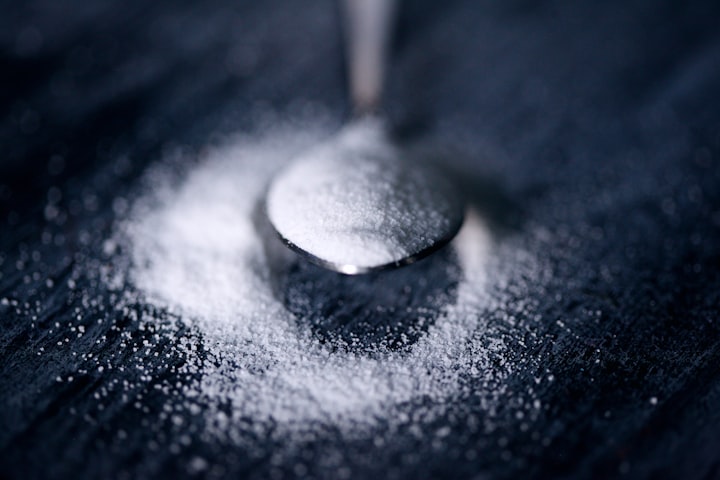Feeling A Bit Salty
Well, that was shamefully eye-opening ...

Feeling a Bit Salty
My husband and I have been gluten-free for several years now. It has really changed our eating habits and nutritional awareness. With a focus still on achieving a healthier diet, we have decided to pay attention to our sodium intake. Shouldn’t be too much of a difficulty, as we don’t eat out often, hardly ever eat anything deep fried, don’t use processed foods very much, or add much salt in food preparation. When we do purchase products for cooking, we try to get the low-sodium option.
Last night, we had black bean nachos for dinner and then today, the leftovers for lunch. We then got curious and started checking the sodium content of each thing we were consuming. That experience was mind blowing, making me want to throw up everything I had just eaten!
I had added no salt to the meal during prep or serving, yet we were well over the daily recommended limit for sodium intake, which is noted by the FDA and AHA to be less than 2,300 mg/day, - that equals about one teaspoon. It’s recommended to consume under 1,500 mg/day, and the body can get by easily on 500 mg/day, which is less than 1/4 teaspoon, by natural means, provided through the healthy functioning of kidneys. Healthy people don’t need to consume processed salt at all - ever - if we eat a well-balanced diet. On average, Americans consume over 3,400 mg/day of sodium.
Are salt and sodium the same thing? Here’s what the FDA has to say:
The words “table salt” and “sodium” are often used interchangeably, but they do not mean the same thing. Table salt (also known by its chemical name, sodium chloride) is a crystal-like compound that is abundant in nature. Sodium is a mineral, and one of the chemical elements found in salt.
My husband has repeated high blood pressure issues. Not chronic, but enough that the doctor wants to prescribe blood pressure medication. He always asks if my husband consumes a lot of salt, to which the answer has always been no. Upon further investigation, although we rarely add salt to anything we eat, it seems we ingest way too much sodium, only acquired from the prepared products we buy! It’s already in there beyond our control A dietary intervention is required.
We have already discovered more options to replace even low-sodium versions of products, and items we can make ourselves. If we do wish to add salt, I like the option of controlling the amount ourselves.
The immediate effects of high sodium intake may include excessive thirst, swelling of hands or feet, and sometimes, headache. Long-term effects of high sodium intake often include high blood pressure, stroke, heart disease, kidney disease and kidney stones.
I, personally, have noticed some edema around my ankles. I wonder if decreasing my salt intake will impact the swelling?
My goal is to learn how to prepare foods using fresh herbs and spices for flavoring as way to replace salt for flavor. Salt is an incredibly overpowering flavor that we, as a nation, have gotten so used to, that often we are put-off by the taste of unadulterated food, labelling it as bland. Often times, it’s not bland, just unappreciated. We need to take back our palates and start enjoying naturally flavored foods again!
Thank you for reading! I encourage you to check the sodium content of your regularly consumed food products - it could impact the way you eat, and make you question your need for prescribed medications in place of dietary changes!
What can you add in place of salt?
About the Creator
KJ Aartila
A writer of words in northern WI with a small family and a large menagerie.
My Substack
Enjoyed the story? Support the Creator.
Subscribe for free to receive all their stories in your feed. You could also pledge your support or give them a one-off tip, letting them know you appreciate their work.
Reader insights
Outstanding
Excellent work. Looking forward to reading more!
Top insights
Expert insights and opinions
Arguments were carefully researched and presented
Easy to read and follow
Well-structured & engaging content
Excellent storytelling
Original narrative & well developed characters
Eye opening
Niche topic & fresh perspectives
Heartfelt and relatable
The story invoked strong personal emotions
Masterful proofreading
Zero grammar & spelling mistakes
Compelling and original writing
Creative use of language & vocab
On-point and relevant
Writing reflected the title & theme







Comments (11)
Me too lately...
Great post! Too much salt is also terrible for water retention, but handy if you want to sleep a full 8 hours without having to get up to pee 😉 My salt habits certainly need to change!
Very relatable, thanks for sharing!
Herbs and spices are excellent salt substitutes! Lemon zest or juice would work too! Excellent article explaining the different between table salt and sodium!
Well done!!!💕💖😊
I appreciate your story. Two years ago I was diagnosed with high blood pressure and placed on medication. I did my own research into sodium in foods and was surprised that many things have naturally occurring sodium in them as well ... Especially animal-based proteins - meat, dairy and eggs. When I started to be more aware of sodium levels in the foods I ate, both home cooked and prepared (canned tomatoes, for example), I also noticed I had to be cognizant of portion sizes as well. In a lot of cases that alone cut my sodium consumption down significantly. Good luck on your journey.
I'm so glad you found the source(s) of the additional sodium in you and your husband's diet. It's amazing what we find when we read the labels. And now companies get to be tricky with how things are categorized, named and worded. The suggestion my clients use the most is replacing salt with dulse seaweed.
Such an important topic. I am floored by how much sodium is in dressings, marinades and sauces which are my downfalls. Thank you for writing and congratulations on your top story!
Great work and congrats on your Top Story
This comment has been deleted
I can eat salt out of the palm of my hand. I have been changing some seasoning. But there is no denying I am over the daily limit. I can't eat bland food or go back to a natural pallet. I might low the salt intake but give it up never. I can't say yet anyway.
Congrats on your Top Story!! I loved your saltiness, lol! This was a great article on a subject that does not receive enough awareness until there's a problem. I have never liked salty foods and never add salt to my food unless I can help it. Even then, I go very light. I don't salt my veggies or french fries or much of anything, but I bet I consume way more than I think. I'll have to start looking at more nutritional facts. Thanks for bringing this to light :)
This comment has been deleted
This comment has been deleted